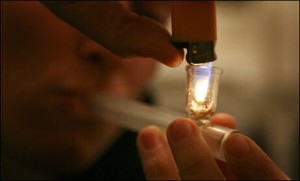Carl V. Hughes IV, a 28-year-old Chesterfield County man, had a serious addiction to crack cocaine. Living with his sister and elderly parents, he frequently stole from them to support his habit. According to testimony from a recent trial, he’d stolen a video game system and games from his sister, a laptop computer and car from his mother, and a video game system and cell phone from his former girlfriend and mother of his child.
On Sept. 22, high on crack and resentful of ridicule for his out-of-control drug use, he felt like he had “no other alternative” than to “erase” his family. He proceeded to stab his father and mother to death in their sleep, and then his sister as she watched television. After the killings, he met a woman in a hotel on Jefferson Davis Highway, purchased more crack and smoked it with her. Later, he pawned his mother’s wedding ring and two other rings to buy more drugs.
The next day, police found him at the railing of the Lee Bridge, where he was threatening to commit suicide. He was distraught at what he’d done, telling police “he could not believed he killed his sister” because she “was the only one who loved” him. The Times-Dispatch has the details of the story here.
It’s a tragic story all the way around. It’s also a powerful reminder of (a) the power of crack cocaine to destroy peoples’ lives, not just the lives of users but the people around them, and (b) why there are laws on the books that dish out harsher penalties for crack than powdered cocaine, a disparity than many have decried as racist because crack users are disproportionately African-American.
The story also occurs against a growing sense of white guilt at the “mass incarceration” of African-American men and concern about the impact that incarceration has on the black family — it’s difficult for a man to be a good husband and father while he’s stewing in jail — when one-third of African-American males wind up in jail or prison at some point in their lives, often for seemingly victimless crimes like drug possession.
I have no doubt that there are injustices in the criminal justice system, and I’m open to the idea that there are better ways to handle the epidemic of substance abuse (which is just as prevalent among whites as it is among blacks, incidentally) than throwing every offender in jail. I also share the belief that drug addicts have a problem that cannot be solved by incarceration; they need help dealing with their substance abuse. However, amidst the rush to portray drug users as victims of institutional racism, I have seen little acknowledgement as the debate has unfolded that drug addicts often prey on the people around them — stealing their money, pawning their possessions, assaulting them, dumping familial responsibilities others, and, in extreme cases like Hughes’, killing them.
Family members of substance abusers are the silent victims. Hughes’s family came to the notice of the public only because a triple homicide is such an extreme case. But before the murders, no one knew about or cared about Hughes’ endless predation upon family members in a series of petty crimes that most likely were never reported. How many thousands of other families in Virginia are suffering silently from a substance abuser close to them? How many of them feel oppressed by their presence, and how many, at some level, feel liberated when their oppressor is put in jail?
It’s good to have a conversation about the mass incarceration of young African-American men. We should be investing more resources in programs that help substance abusers kick their habit and ease their transition from jail and prison back into society. But we also need to be cognizant of their silent victims, who also happen to be African-American and whose interests may not be served by handing out get-out-of-jail free cards to the people who rob and abuse them. Those people have rights, too. Their rights just aren’t politically fashionable right now.



